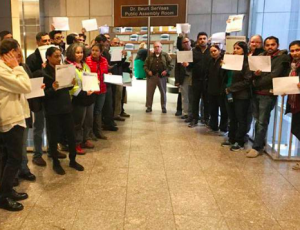
(“More than a dozen people protested at the meeting. Some are owners of hotels they say would fail the city’s test.” WFYI)
Indianapolis city leaders hope “to decrease crime by flagging high-crime hotels, then giving owners a two-year period to either improve conditions or risk losing their license,” according to a WFYI report. The ordinance, which passed in March, targets hotels with a ratio of 2.5 or more emergency calls made per room.
“If this measure had been in place in 2017, 15 Indianapolis hotels likely would have been affected,” The Indianapolis Business Journal reports. “The city information shows those 15 hotels generated nearly 2,700 police and fire calls last year. Eight of those establishments generated more than 150 calls each in 2017 and another was responsible for 149. Three were the site of more than 300 calls, and police and firefighters responded to a whopping 510 calls at the Motor 8 Inn on North Shadeland Avenue. That’s 1.4 times a day.”
Guest Rights and Hotel Responsibility
By law, hotel owners have a duty to protect guests from any foreseeable harm. For example, should a hotel owner be aware of prior violence on or near their property, they have a duty to take security precautions to deter such crime in the future and to provide a safe and secure premises for their guests.
Hotel owners are encouraged to implement property security precautions and preventative measures to protect guests and reduce property violence, sexual assaults, injuries, and deaths.
We’ve Recovered Millions for Victims of Hotel Security Negligence…Contact us Now for a Free Consultation.
 The Murray Law Firm has an extensive and successful record representing victims of violence and security negligence. We have recovered millions of dollars for our Clients, and we recently obtained a $29.25 million dollar verdict for a victim of an unsafe property. We offer our legal assistance, if desired.
The Murray Law Firm has an extensive and successful record representing victims of violence and security negligence. We have recovered millions of dollars for our Clients, and we recently obtained a $29.25 million dollar verdict for a victim of an unsafe property. We offer our legal assistance, if desired.
We represent our Clients on a contingency agreement, which generally means that no fees or payments are owed until and unless we recover. Anyone seeking further information or legal representation is encouraged to contact us via e-mail (click here) or by telephone at 888.842.1616. Consultations are free and confidential.
Choosing the Right Attorney
Selecting the right attorney for you or your family is highly important. You must feel confident that the attorney you hire has a complete understanding of the law applicable to your particular case, and has successful experience in handling such cases.
Important: Do not hire a lawyer who has violated the Rules of Professional Conduct!!!
You should not hire an attorney who calls you or visits you unsolicited, or anyone that contacts you directly to offer legal services. This activity is strictly prohibited by Rule 7.3 of the American Bar Association (ABA) Model Rules of Professional Conduct, which states as follows:
 A LAWYER “SHALL NOT” CONTACT A PROSPECTIVE CLIENT THROUGH A “LIVE TELEPHONE” OR AN “IN-PERSON” VISIT.
A LAWYER “SHALL NOT” CONTACT A PROSPECTIVE CLIENT THROUGH A “LIVE TELEPHONE” OR AN “IN-PERSON” VISIT.
– RULE 7.3, ABA MODEL RULES OF PROFESSIONAL CONDUCT.
If an attorney, or someone acting on behalf of an attorney, contacts you in this manner, that attorney is in violation of this Rule. This unethical and unprofessional activity on the part of the lawyer is good sign that you should stay away. It is imperative that you are represented by an attorney who is capable of advocating for you within the confines of the law, and an attorney who fails to abide by the Rules of Professional Conduct is probably not the best fit. In fact, any such attorney should be immediately reported to the local State Bar Association. If you have been contacted in such an unsolicited manner, contact us and we’ll assist you in filing a report.
Contingency Fees Disclaimer: “Contingent attorneys’ fees refers only to those fees charged by attorneys for their legal services. Such fees are not permitted in all types of cases. Court costs and other additional expenses of legal action usually must be paid by the client.”
SaveSave
SaveSave
SaveSave
 The Legal Herald
The Legal Herald


